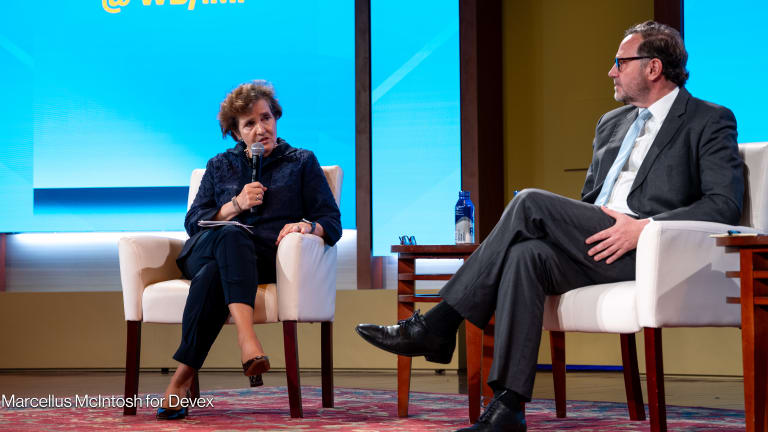Amid ODA budget slashes, what talent are Dutch NGOs seeking?
A series of billion dollar cuts to Dutch aid has been a blow to the status quo for the Netherlands’ NGO community — and resulted in a major shift in who is employed in what kinds of positions at major organizations like Cordaid, Hivos, Oxfam Novib and SNV.
A series of billion dollar cuts to Dutch aid has been a blow to the status quo for the Netherlands’ NGO community — and resulted in a major shift in who is employed in what kinds of positions at major organizations like Cordaid, Hivos, Oxfam Novib and SNV. In just under five years, one of Europe’s largest donors has undergone a complete transformation, dropping its commitment to spend 0.7 percent of its gross national income on aid and cutting its number of bilateral partners in half. By 2017, the coalition government’s decision to cut a total of 1 billion euros from its development cooperation budget is expected to be realized, alongside its plans to refocus its core budget for civil society actors to lobbying and advocacy efforts. To stay afloat and maintain influence amid the expected losses in income, organizations are cutting staff, severing ties with local partners, closing offices and letting go of several focus areas. But the changes have also allowed organizations to strategize for less dependence on one single source of funding and encouraged innovation within. A new and necessary focus on fundraising from a wide array of bilateral donors means hiring professionals with specific skill sets, such as proposal writing and donor relations. Devex spoke to executives at four Dutch development organizations, most of whom are still in the midst of reorganizations, to find out what their slimmed down operations will look like in the coming years — and what kind of talent they’ll need to shape their new vision. Leaner and lighter Hivos, according to Director of Programs Ben Witjes, knew it would become a smaller, leaner organization when the government announced aid cuts would arrive in full force in 2016. The organization was drawing an average of 50 million euros a year from MFS II, covering between 40 to 50 percent of its annual budget. In 2016, the organization may just receive about 10 million euros from the new budget line. The current CSO-government co-financing mechanism will end in 2015, to be replaced by a new framework of strategic partnerships with a singular focus on lobby and advocacy — leaving no room for service delivery. The budget for CSO partnership will be cut by more than half, with an earmarked amount of 185 million euros per year to replace the current 385 million euros. Despite ongoing effort to mitigate the losses, Witjes had no illusions, he said. “We are not aiming to fully compensate for the loss of [Dutch] government income,” Witjes said. “If half of your resources are coming from one single source, it’s very difficult to fully cover that gap in a short period of time.” But it meant a staff reduction of almost 30 percent, mainly affecting headquarters (down to 80 from 120 staff) but also Hivos’ regional offices. The organization also decided to close its office in India, and merge its two regional offices in Latin America — a decision not unique to Hivos. In cases where they find themselves needing to trim down, SNV is open to the option of a country director managing two or three countries, according to CEO Allert van den Ham. SNV’s country director who resides in Nicaragua, for example, also leads the organization’s work in Honduras. Oxfam Novib has also had to close some of its programs in Central Asia and several countries in Africa. In 2015, as part of a reorganization driven by an income loss of 55 million euros, it was forced to stop programs in Bangladesh, Sudan, Rwanda and Zimbabwe, a decision made after assessing which other civil society players and Oxfam branches were present and evaluating their own programs’ strengths and weaknesses.. “In those four countries, there’s absolutely reason to work and remain there, from [addressing] poverty injustice to human rights … all reasons to be there. However … we had to take tough decisions,” Oxfam Novib CEO Farah Karimi told Devex. Project-based funding An increasing number of opportunities organizations look to will be tendered or project-based, an area many of these NGOs are unaccustomed to. As a result, there will be an increased need for talent that can understand different donors’ requirements. “We [also] need people with scouting acumen, who can sniff out and analyze trends, sit with local organizations and do needs analysis, and build on that with partners to develop programs,” said Witjes. A lot also depends on execution, he added, and many NGOs, including Hivos, are investing more in program management. Witjes, however, also stressed internal talent development. “We filled internally the vacant positions — that’s the first thing you do … look at to what extent you can retain present staff. [And for those] not matching new requirements, maybe you can provide tailored training,” he said. Oxfam Novib took the same approach when it looked into its own staffing after slimming down focus areas. Leadership first looked at the job descriptions and functions it needed, then checked internally whether they could be filled by existing staff needed to be sourced externally. Eighty percent of positions were filled by existing staff, but only a third of those positions were existing. The rest were newly created positions or substantially changed ones — some of which are still being hired for. Some of these positions are in headquarters, in the Netherlands, but expect plenty of job opportunities in the field as these organizations take on a more implementing role as opposed to their traditional fund management. The catch though is that most roles will likely be project-based, depending on the length of the contract with a specific donor. While facing a more diversified donor base, most of the available funding is tendered, leaving little room for flexibility or pay for costs on overhead, including R&D, M&E and innovations — a situation that concerns Cordaid CEO and former Ambassador Simone Filippini. In fragile and conflict-affected areas, for example, where contributing to building more resistant, self-reliant communities is often extremely time intensive, “it’s very difficult to convince donors that they have to be relatively generous on overhead,” she said, adding that “it’s a shame the MFS II program is being phased out with a view to the above and because of the valuable integrated character of the program enabling us to generate community based and managed multi-faceted solutions responding to the complex realities people in such environments face.” “I think it was a program that so many others looked at with a form of jealousy because it enabled us to play into the demands on the ground, instead of having to perform on the basis of demand of our own government,” she said. The time Cordaid now spends on looking for funding is tenfold compared with the past, she said. Concerns The difficulty in keeping “good staff” if funding is project-bound already frustrates van den Ham of SNV, as does being unable to employ those with potential just because they don’t have the required number of years of experience. With tenders, which is increasingly the source of funding for most Dutch NGOs, organizations “win points” or get more chances of securing a contract if the people they vet for the project have a long track record or more experienced — a practice many large contracting firms are very familiar with. The sector needs more young people, but thanks to strict hiring parameters, more experienced professionals are almost always chosen, Van den ham said. “I think there is a danger that we too much rely on proven experience, [leaving] too little to new entrants to the labor market … as young people don’t have a long track record and they are not making your team stronger — at least on paper,” he said. The CEO recalled a number of young professionals he encountered who “are really good” but whom he’s “forced” to leave out in SNV projects and competition because they only have two years of experience. ”It’s not good for them, for us and the sector,” he noted. Whether you’re a seasoned expert or budding development professional — check out more news, analysis and advice online to guide your career and professional development, and subscribe to Doing Good to receive top international development career and recruitment news every week.
A series of billion dollar cuts to Dutch aid has been a blow to the status quo for the Netherlands’ NGO community — and resulted in a major shift in who is employed in what kinds of positions at major organizations like Cordaid, Hivos, Oxfam Novib and SNV.
In just under five years, one of Europe’s largest donors has undergone a complete transformation, dropping its commitment to spend 0.7 percent of its gross national income on aid and cutting its number of bilateral partners in half. By 2017, the coalition government’s decision to cut a total of 1 billion euros from its development cooperation budget is expected to be realized, alongside its plans to refocus its core budget for civil society actors to lobbying and advocacy efforts.
To stay afloat and maintain influence amid the expected losses in income, organizations are cutting staff, severing ties with local partners, closing offices and letting go of several focus areas.
This story is forDevex Promembers
Unlock this story now with a 15-day free trial of Devex Pro.
With a Devex Pro subscription you'll get access to deeper analysis and exclusive insights from our reporters and analysts.
Start my free trialRequest a group subscription Printing articles to share with others is a breach of our terms and conditions and copyright policy. Please use the sharing options on the left side of the article. Devex Pro members may share up to 10 articles per month using the Pro share tool ( ).
Jenny Lei Ravelo is a Devex Senior Reporter based in Manila. She covers global health, with a particular focus on the World Health Organization, and other development and humanitarian aid trends in Asia Pacific. Prior to Devex, she wrote for ABS-CBN, one of the largest broadcasting networks in the Philippines, and was a copy editor for various international scientific journals. She received her journalism degree from the University of Santo Tomas.








